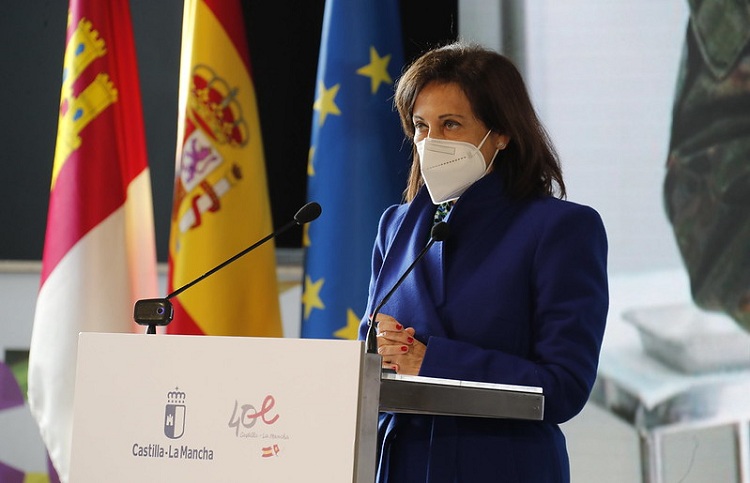The Diplomat
Spain has decided to intensify its military involvement in the Ukraine crisis by possibly sending several Air Force fighters to Bulgaria to participate in NATO’s air deterrent deployment in Eastern Europe and with the incorporation of two Navy ships to the Alliance’s permanent fleet in the Black Sea.
In statements to the press during a visit to the vaccination post at the Corral de Calatrava Health Center in Ciudad Real, the Minister of Defense, Margarita Robles, announced yesterday that, within “three or four” days, the frigate Blas de Lezo will sail to the Black Sea, where it will join the Maritime Action Ship (BAM) Meteoro, which left last Monday from Las Palmas de Gran Canaria bound for the Black Sea to lead one of NATO’s permanent missions. The frigate Blas de Lezo was scheduled to join the NATO operation in the coming weeks, but Defense has opted to bring forward its departure to next week in view of the direction the crisis is taking.
Likewise, Robles explained that NATO is assessing the possibility of an air deterrent deployment in Bulgaria and that Spain could join this operation by sending several Air Force fighter-bombers, which would join the fighters that our country already sends every year to Lithuania and the deployment of 350 military personnel that Spain has maintained for six years in Latvia to control the Baltic airspace against Russian military incursions.
In her declarations, the minister recalled that Spain has been participating in NATO missions “for many years”, although on this occasion it has opted to send the minehunter and to bring forward the frigate in order to demonstrate that Spain is “a serious ally”. She also insisted that “the position of Spain, as of NATO as a whole, is that the response should be diplomatic and that there should be a de-escalation”, but “the position of all NATO countries is clear: Russia cannot tell any country what to do”. “NATO is going to protect and defend the sovereignty of any country that wants to join” the Alliance, she added.
Russia has been massing troops on the Ukrainian border for several months, raising fears of a possible invasion of the country. Alarm bells have been raised especially in recent weeks after Moscow announced the upcoming large-scale maneuvers across the national territory with the participation of more than 140 ships and nearly 10,000 troops. “The Russian Navy will hold a series of exercises in all areas of the fleet’s responsibility,” the Russian Defense Ministry said in a statement.
U.S. Secretary of State Antony Blinken traveled to Kiev on Tuesday to meet with Ukrainian leaders and show the White House’s support for the country’s sovereignty in the face of the Russian threat. The Secretary of State’s trip took place immediately after receiving in Washington the Spanish Minister of Foreign Affairs, José Manuel Albares, with whom he agreed on the defense of “the sovereignty and territorial integrity of Ukraine” and on the warning that “any new Russian aggression against Ukraine will result in a severe response”.
For the time being, the White House has ruled out the possible dispatch of forces to Ukraine, opting instead to threaten Russia with economic and technological sanctions, although the State Department has authorized the shipment of missiles and other U.S.-made weapons to Ukraine from Lithuania, Latvia and Estonia. U.S. President Joe Biden stated at a press conference last Wednesday that his impression is that Russia is going to “invade” Ukraine and that, if it does, “it will pay for it”. For their part, both the EU and NATO have always insisted that any aggression against Ukraine would have “serious consequences” for Russia.
Criticism from Sánchez’s partners
The decision by Pedro Sánchez’s government has not gone down well with his government partner, Unidas Podemos, whose leaders have expressed their disagreement with Spain’s involvement in a possible NATO action in defence of Ukraine. The most outspoken in his criticism was the spokesman for the purple party in the Foreign Affairs Committee, Gerardo Pisarello, who pointed out that “after the fiasco in Afghanistan, following the United States in this warmongering bravado is reckless and irresponsible”.
For her part, the Secretary for International Affairs of Podemos, Idoia Villanueva, described as a “grave error” what she considered to be “encouraging the escalation of warmongering in Ukraine to defend the interests of the United States”. The State Secretary for the 2030 Agenda and Secretary General of the Communist Party, Enrique Santiago, also stated that “pushing NATO towards Russia is a serious mistake for Europe, threatens peace and is strategically clumsy”. And even the former secretary general of Podemos and former vice-president of the government, Pablo Iglesias, said: ‘The pro-US furore ended with Aznar and today it would be very clumsy for the socialist part of the government to confront all its partners and set up the ‘war party’ with the PP’.






